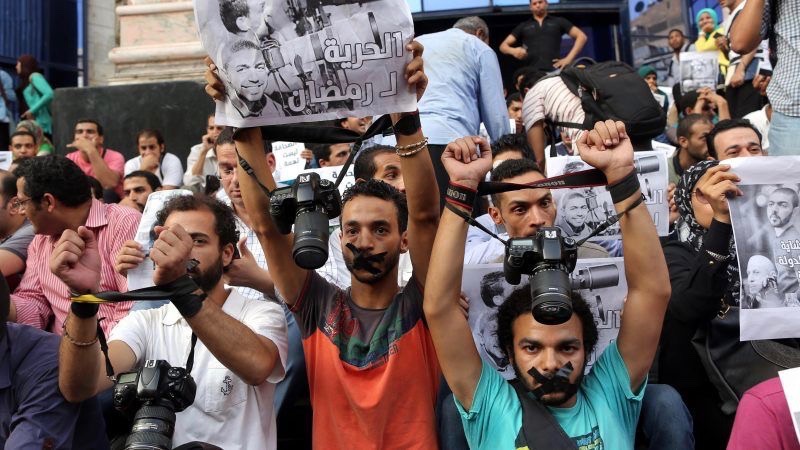63 international human rights and civil society organizations signed a letter calling on the Egyptian government to “immediately end a crackdown on freedom of association, independent groups, and peaceful dissent,” Middle East Eye reported on Tuesday, June 1. Among the prominent organizations that signed the letter are Access Now, Freedom House, Democracy for the Arab World Now (DAWN), Cairo Institute for Human Rights Studies (CIHRS), EuroMed Rights, Egyptian Initiative for Personal Rights (EIPR), Odhikar Bangladesh, Amnesty International, Human Rights Watch and Egyptian Human Rights Forum.
The letter urges the Egyptian government to take steps like “establishing a moratorium on executions, pending the abolition of the death penalty” and “immediately and unconditionally release anyone held solely for peacefully exercising their rights to freedom of expression, association and assembly; and release others detained arbitrarily, including those held in prolonged pretrial detention without trial or the possibility to challenge the lawfulness of their detention.” It calls on the government to “publicly condemn and order independent, impartial, thorough, and effective investigations into extrajudicial executions and other unlawful killings, enforced disappearances, torture, and other serious human rights violations and crimes under international law, including those committed in custody” and “prevent sexual and gender-based violence and prosecute offenders.”
The letter expresses concern over arbitrary arrests, detention and judicial persecution of human rights activists in Egypt. It highlights the case of NGO directors Mohamed al-Baqer and Ezzat Ghoniem, human rights researchers like Patrick George Zaki and Ibrahim Ezz el-Din, and lawyers like Mahienour al-Massry, Haytham Mohamdeen, and Hoda Abdelmoniem, who have faced persecution by the state. It also denounces the “outrageous” 15-year prison sentence awarded in absentia to the founder and director of CIHRS, Bahey Eldin Hassan.
Measures to suppress dissent and free speech such as travel bans, asset freeze, adding activists to ‘terrorist’ lists, and blocking hundreds of independent news outlets were heavily criticized by the signatory organizations. The letter also notes the ongoing illegal detention of at least 28 journalists, including Esraa Abdelfatah and Ismail Iskandarani, as an issue of “serious concern.”
The organizations in the letter agree with the conclusions of the UN Working Group on Arbitrary Detention which found that arbitrary detentions in Egypt constituted a chronic and systemic violation of rights. They noted that the Egyptian security forces, public prosecutors and judges have worked on government instructions to arbitrarily arrest and prosecute hundreds of dissenters with malicious and serious criminal offenses related to ‘terrorism’.
The letter adds that detainees are forced to live in inhumane conditions and the prison authorities deliberately deny them proper medical care. This has resulted in severe illnesses and deaths of many prisoners. At least 35 people reportedly died in 2020 due to medical complications while in custody. This includes the death of well-known video director/photographer Shady Habash after over two years in pre-trial detention.
Human rights organizations have repeatedly raised alarm regarding the state persecution of activists and dissenters in Egypt. As per estimates, there are over 60,000 political prisoners in Egypt, which includes human rights activists, religious minority rights activists, peaceful protesters, journalists, academics, artists, lawyers, opposition politicians, and relatives of dissidents forced into exile. Egyptian president Abdel Fattah el-Sisi snatched power in a 2013 military coup from the first and only democratically elected president, Mohammad Morsi.
Morsi was himself detained for years until he died reportedly due to custodial torture and mistreatment. The signatories to the letter urge the United Nations Human Rights Council to establish a mechanism for monitoring and reporting violations of human and civil rights in Egypt until there is noticeable improvement in the human rights situation in the country.





